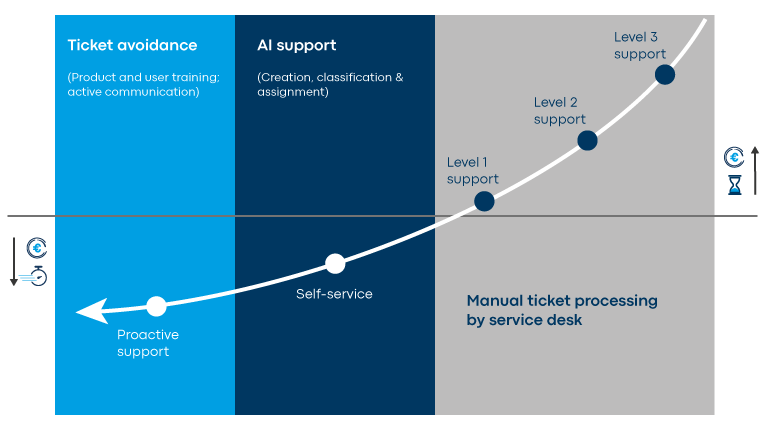AI in ITSM: How you can free up support and deal with resource problems

Artificial intelligence (AI) in IT service management helps to process standard requests faster. This relieves support staff and gives them time to take care of the more difficult and time-consuming tickets. In this news article, find out which problems AI can take over in ITSM, how machine support works without compromising quality, and why investing in AI-enabled software is worthwhile.
Content of this article
-
The challenge of IT service management
-
Why AI in ITSM is a useful aid
-
The benefits of using AI in ITSM
-
Conclusion: AI leaves more time for the difficult requests
The challenge of IT service management
Service desks often struggle with a time and resource problem. Few employees have to handle numerous requests within a short period of time. Even though the majority are usually standard, recurring problems, this is time-consuming. Employees have to
- read each incoming message and create a ticket for it,
- classify each ticket and assign it to a category, and
- find and assign the appropriate solution for each ticket.
Even with prefabricated answers for common tasks, this consumes valuable time that is ultimately lacking to deal with complex, individual cases. AI in IT service management (ITSM) helps solve this resource problem.
Why AI in ITSM is a useful aid
Artificial intelligence refers to systems that can be used to automate decision-making processes. By using machine learning, the system can derive patterns or rules from existing data, generate knowledge and learn from it. Modern systems work with neural networks or deep learning to understand and process language and images.
These are perfect skills for ITSM—at least for problems, incidents and service requests that recur again and again, that and can be processed in the same or very similar way. Once learned, an AI can recognize standard requests, understand natural language, read visual media such as screenshots, and solve routine tasks on its own. How well it can do all this, however, depends largely on the database.
Artificial Intelligence in ITSM can therefore assist level 1 support and handle recurring processes with a very similar structure to this:
- Analyzing the message, identifying relevant data and fitting the description.
- Creation, classification and categorization of the ticket
- Searching and linking the proposed solution
In the process, the AI remembers each ticket it processes and learns. For example, it can recognize which installation instructions match which drivers, which problems require a link to the knowledge database, or how customers can return a product.
In addition, AI in ITSM can recognize which problems it is unable to handle itself and must pass on to a human specialist. Based on feedback, it can also learn over time which team member can solve which requests most efficiently—and distributes the tickets accordingly
Good to know: When the AI automatically links knowledge database entries to problems, it becomes necessary to maintain the existing entries properly and keep them up to date. This is a valuable side effect that benefits everyone involved in the long term and also relieves the help desk.
The benefits of using AI in ITSM
Artificial Intelligence in ITSM is more helpful the higher the degree of automation. This means that the more simple requests the software can process, the more resources the support team has for the really complex, tricky cases. This increases satisfaction in IT, other departments and—most important—among customers. At the same time, the use of AI in service management pays off in terms of the shift-left approach.
The goal of AI in IT service is therefore for the machine to take over as many simple work steps as possible.
It is impossible to say in general terms how much time, money and personnel resources can be saved with the help of artificial intelligence. This is highly dependent on individual factors such as implementation costs, incoming requests, and the quantity and quality of the training data.
However, our use case shows how many working days could be saved with the help of AI in ITSM. Our calculation is based on real-world averages for ticket processing.
| A service desk receives 1000 tickets via email per month. | ⇒ 1,000 new tickets each month | 12,000 tickets per year |
| Of these, 80% are tickets that correspond to the character of frequently recurring standard requests. | ⇒ 800 new tickets each month | 9,600 tickets per year |
| Each of these tickets takes an average of 20 minutes to complete. | ⇒ ~266 hours each month | ~3,200 hours per year |
| Half of this amount is spent on analyzing, classifying, linking and routing tickets. | ⇒ ~133 hours each month | ~1,600 hours per year |
| Calculated total savings: | ⇒ ~200 working days per year saved by AI for automatic analysis and results processing of incoming requests. |
What’s behind the shift-left approach?
The shift-left approach is about bringing forward steps in a process and executing them earlier than actually planned (for example, via AI-controlled automation). In IT support, the concept shift-left would also be a shift toward level 1 support or not even involving it at all if a request can also be solved without human interaction (via self-service or proactive issue avoidance). The goal here is to find defects more quickly and prevent problems—before a ticket would even arise. In ITSM, this means, among other things, that IT empowers employees in other departments and/or customers to solve minor problems themselves. For example, support can proactively recommend actions instead of responding to requests and letting the support curve “escalate”.

Conclusion: AI leaves more time for challenging requests
Artificial intelligence in ITSM is good at taking over repetitive and similar standard tasks. This supports the support staff and saves valuable resources. The important thing to remember here is that data quality determines how successful the use of AI in IT service management is. The better the quality and quantity of the data, the better the machine learns and the more tasks it can take on. And the more time IT ultimately has to deal with the difficult tickets. All in all, these effects have a positive impact on the (personnel) resources required as well as on customer satisfaction, since simple requests are resolved faster and complex concerns are resolved better.
Would you like to know how AI can specifically support your helpdesk? We would be happy to advise you in detail and find an individual ticketing solution for your company.